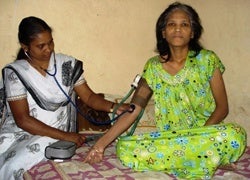February 22, 2012
There is a myth that chronic diseases such as cancer and diabetes are only a problem for wealthier countries. But in fact, noncommunicable diseases (NCDs) kill 28 million people annually in low- and middle-income countries. Eight million of these deaths—more than those who die each year from AIDS, tuberculosis, and malaria combined—are preventable through lifestyle changes and improved access to quality, affordable health care services.
But Jonathan Quick, a physician and president of the nonprofit Management Sciences for Health, told an HSPH audience on February 8, 2012, that current trends point to the problem getting worse before it gets better. However, the tide can be turned, he said, if global health practitioners learn to apply the lessons from the past decade’s fight against AIDS.
During the “AIDS Decade,” which Quick defined as beginning in the early 2000s with several key events including a High-Level Meeting of the United Nations General Assembly and the founding of The Global Fund to Fight AIDS, Tuberculosis and Malaria, the global community committed an unprecedented $80 billion to combat infectious diseases. AIDS treatment increased 50-fold, and care for orphans and others made vulnerable by AIDS greatly improved. Prevention efforts were slow to launch and could still be improved, Quick said, but the rate of new infections from AIDS peaked in 1997 and deaths peaked in 2005.
Now we are in the “NCD Decade,” and public health professionals must do a better job at mobilizing society-wide responses to the complex web of risk factors contributing to chronic diseases, Quick said. For example, as populations urbanize and develop, they may lose access to healthy food and adopt more sedentary lifestyles, increasing their risk for heart disease. Prevention efforts should focus on interventions with wide-ranging impact, such as raising cigarette taxes and banning smoking in bars and restaurants. And planning, financing, and delivery of health care services must be integrated and efficient in an environment of diminishing resources, he said. Clinics are already experimenting with screening for cancer during appointments for HIV services.
Given the current global economic climate, there isn’t likely to be a Global Fund for NCDs, Quick said. A better focus is on improved access to care for all. He called for a global social movement to encourage countries to transform their health systems to provide universal health coverage.
Quick cited the efforts of AIDS activists as a driving force in reducing stigma against those living with the disease and improving access to treatment and prevention. Movements catalyzed by people living with cancers, diabetes, and cardiovascular and respiratory diseases, and other NCDs could achieve similar results, he said.
“When people have never seen a national AIDS program, they think of all kinds of reasons why you can’t do it,” Quick said. “The conversation changes when you have proof that something can be done.”
–Amy Roeder
Learn more
Quick co-authored an editorial on the Huffington Post with Felicia Knaul, director of the Harvard Global Equity Initiative, in conjunction with World Cancer Day. Read
Strengthening Health Systems to Address New Challenge Diseases (NCDs) (Harvard Public Health Review)
Dean Frenk Urges Action on Noncommunicable Diseases in Poor Countries
